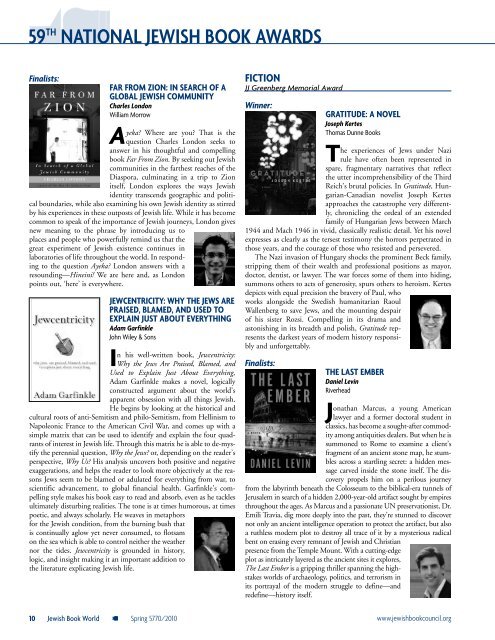reviews - Jewish Book Council
reviews - Jewish Book Council
reviews - Jewish Book Council
Create successful ePaper yourself
Turn your PDF publications into a flip-book with our unique Google optimized e-Paper software.
59 TH NATIONAL JEWISH BOOK AWARDS<br />
Finalists:<br />
FAR FROM ZION: IN SEARCH OF A<br />
GLOBAL JEWISH COMMUNITY<br />
Charles London<br />
William Morrow<br />
Ayeka? Where are you? That is the<br />
question Charles London seeks to<br />
answer in his thoughtful and compelling<br />
book Far From Zion. By seeking out <strong>Jewish</strong><br />
communities in the farthest reaches of the<br />
Diaspora, culminating in a trip to Zion<br />
itself, London explores the ways <strong>Jewish</strong><br />
identity transcends geographic and political<br />
boundaries, while also examining his own <strong>Jewish</strong> identity as stirred<br />
by his experiences in these outposts of <strong>Jewish</strong> life. While it has become<br />
common to speak of the importance of <strong>Jewish</strong> journeys, London gives<br />
new meaning to the phrase by introducing us to<br />
places and people who powerfully remind us that the<br />
great experiment of <strong>Jewish</strong> existence continues in<br />
laboratories of life throughout the world. In responding<br />
to the question Ayeka? London answers with a<br />
resounding—Hineini! We are here and, as London<br />
points out, ‘here’ is everywhere.<br />
JEWCENTRICITY: WHY THE JEWS ARE<br />
PRAISED, BLAMED, AND USED TO<br />
EXPLAIN JUST ABOUT EVERYTHING<br />
Adam Garfinkle<br />
John Wiley & Sons<br />
In his well-written book, Jewcentricity:<br />
Why the Jews Are Praised, Blamed, and<br />
Used to Explain Just About Everything,<br />
Adam Garfinkle makes a novel, logically<br />
constructed argument about the world’s<br />
apparent obsession with all things <strong>Jewish</strong>.<br />
He begins by looking at the historical and<br />
cultural roots of anti-Semitism and philo-Semitism, from Hellinism to<br />
Napoleonic France to the American Civil War, and comes up with a<br />
simple matrix that can be used to identify and explain the four quadrants<br />
of interest in <strong>Jewish</strong> life. Through this matrix he is able to de-mystify<br />
the perennial question, Why the Jews? or, depending on the reader’s<br />
perspective, Why Us? His analysis uncovers both positive and negative<br />
exaggerations, and helps the reader to look more objectively at the reasons<br />
Jews seem to be blamed or adulated for everything from war, to<br />
scientific advancement, to global financial health. Garfinkle’s compelling<br />
style makes his book easy to read and absorb, even as he tackles<br />
ultimately disturbing realities. The tone is at times humorous, at times<br />
poetic, and always scholarly. He weaves in metaphors<br />
for the <strong>Jewish</strong> condition, from the burning bush that<br />
is continually aglow yet never consumed, to flotsam<br />
on the sea which is able to control neither the weather<br />
nor the tides. Jewcentricity is grounded in history,<br />
logic, and insight making it an important addition to<br />
the literature explicating <strong>Jewish</strong> life.<br />
10 <strong>Jewish</strong> <strong>Book</strong> World Spring 5770/2010<br />
FICTION<br />
JJ Greenberg Memorial Award<br />
Winner:<br />
GRATITUDE: A NOVEL<br />
Joseph Kertes<br />
Thomas Dunne <strong>Book</strong>s<br />
The experiences of Jews under Nazi<br />
rule have often been represented in<br />
spare, fragmentary narratives that reflect<br />
the utter incomprehensibility of the Third<br />
Reich’s brutal policies. In Gratitude, Hungarian-Canadian<br />
novelist Joseph Kertes<br />
approaches the catastrophe very differently,<br />
chronicling the ordeal of an extended<br />
family of Hungarian Jews between March<br />
1944 and Mach 1946 in vivid, classically realistic detail. Yet his novel<br />
expresses as clearly as the tersest testimony the horrors perpetrated in<br />
those years, and the courage of those who resisted and persevered.<br />
The Nazi invasion of Hungary shocks the prominent Beck family,<br />
stripping them of their wealth and professional positions as mayor,<br />
doctor, dentist, or lawyer. The war forces some of them into hiding,<br />
summons others to acts of generosity, spurs others to heroism. Kertes<br />
depicts with equal precision the bravery of Paul, who<br />
works alongside the Swedish humanitarian Raoul<br />
Wallenberg to save Jews, and the mounting despair<br />
of his sister Rozsi. Compelling in its drama and<br />
astonishing in its breadth and polish, Gratitude represents<br />
the darkest years of modern history responsibly<br />
and unforgettably.<br />
Finalists:<br />
THE LAST EMBER<br />
Daniel Levin<br />
Riverhead<br />
Jonathan Marcus, a young American<br />
lawyer and a former doctoral student in<br />
classics, has become a sought-after commodity<br />
among antiquities dealers. But when he is<br />
summoned to Rome to examine a client’s<br />
fragment of an ancient stone map, he stumbles<br />
across a startling secret: a hidden message<br />
carved inside the stone itself. The discovery<br />
propels him on a perilous journey<br />
from the labyrinth beneath the Colosseum to the biblical-era tunnels of<br />
Jerusalem in search of a hidden 2,000-year-old artifact sought by empires<br />
throughout the ages. As Marcus and a passionate UN preservationist, Dr.<br />
Emili Travia, dig more deeply into the past, they’re stunned to discover<br />
not only an ancient intelligence operation to protect the artifact, but also<br />
a ruthless modern plot to destroy all trace of it by a mysterious radical<br />
bent on erasing every remnant of <strong>Jewish</strong> and Christian<br />
presence from the Temple Mount. With a cutting-edge<br />
plot as intricately layered as the ancient sites it explores,<br />
The Last Ember is a gripping thriller spanning the highstakes<br />
worlds of archaeology, politics, and terrorism in<br />
its portrayal of the modern struggle to define—and<br />
redefine—history itself.<br />
www.jewishbookcouncil.org


